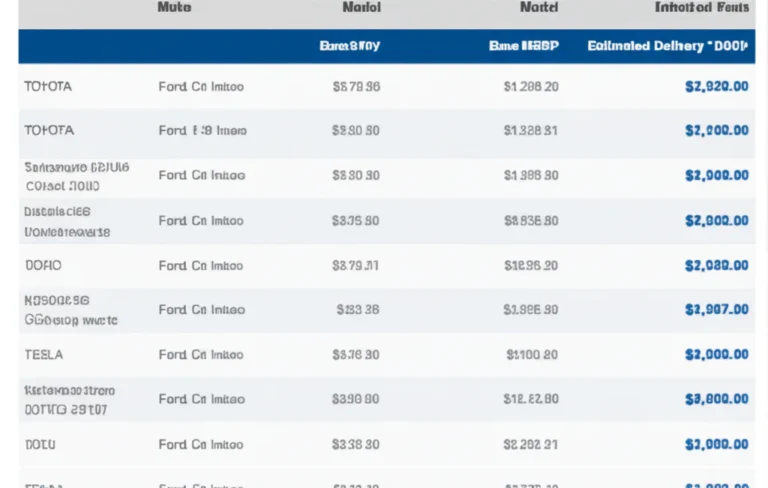Support our educational content for free when you purchase through links on our site. Learn more
Can I Insure a Car That’s Not in My Name? 7 Ways Explained! 🚗 (2025)
Imagine this: your best friend hands you the keys to their car for a week-long road trip, or you just moved in with your partner who owns the vehicle, but the title is still in their name. You want to be covered by insurance, but can you actually insure a car that isn’t registered or titled to you? Spoiler alert: it’s not as straightforward as you might think. At Car Brands™, we’ve dug deep into the ins and outs of insuring vehicles when you’re not the official owner, uncovering 7 smart ways to get coverage without risking denial or financial disaster.
Did you know that nearly 1 in 8 drivers in the U.S. hit the road uninsured? Driving a car without proper insurance can lead to hefty fines, license suspensions, and out-of-pocket expenses that could wreck your wallet. But don’t worry—we’ll walk you through everything from named non-owner policies to co-ownership tricks, and even how to handle rental or employer-provided cars. Plus, we share real stories and expert tips to keep you protected no matter whose name is on the title.
Key Takeaways
- Insurable interest is key: You must have a financial stake in the vehicle to get insured.
- Named non-owner policies offer affordable liability coverage if you don’t own a car but drive regularly.
- Adding yourself to the owner’s policy or co-owning the vehicle simplifies coverage and claims.
- Permissive use covers occasional borrowing, but frequent drivers should be listed on the policy.
- State laws vary widely, so always check local requirements before assuming coverage.
- Borrowing without proper coverage risks denied claims and legal trouble.
- Specialized insurance options exist for rentals, leases, employer vehicles, and classic cars.
Ready to uncover the 7 ways you can insure a car not in your name and avoid costly mistakes? Buckle up—we’re just getting started!
Table of Contents
- ⚡️ Quick Tips and Facts
- How Car Insurance Works: Understanding the Basics of Coverage & Ownership 🤔
- Can You Really Insure a Car Not Registered in Your Name? The Big Question Answered! 🧐
- What is “Insurable Interest” and Why It’s Your Insurance Golden Ticket 🔑
- 🚗 7 Smart Ways to Insure a Vehicle You Don’t Officially Own
- 1. Named Non-Owner Policy: Your Personal Safety Net 🛡️
- 2. Adding You to the Owner’s Policy: The Family & Friends Plan 🤝
- 3. Permissive Use: Borrowing with Peace of Mind 🙏
- 4. Co-Ownership or Joint Ownership: Sharing the Wheel and the Policy 🧑 🤝 🧑
- 5. Lease Agreements: When the Dealership Owns It 📝
- 6. Employer-Provided Vehicles: Business on the Road 💼
- 7. Classic Car or Project Car Insurance: Special Cases, Special Coverage ✨
- Insuring a Rental Car: What You Need to Know Before You Drive Off ✈️
- What About Borrowing a Car from a Friend or Family Member? 🤔
- The Risks of Driving Uninsured: Don’t Get Caught Without Coverage! 🚨
- State-Specific Nuances: Does Location Matter for Non-Owner Policies? 🗺️
- Common Pitfalls and How to Avoid Them When Insuring a Car You Don’t Own 🚧
- Expert Tips for Navigating Non-Owner Car Insurance Policies 💡
- Conclusion: Driving Smart, Insuring Right ✅
- Recommended Links for Further Reading 🔗
- Frequently Asked Questions (FAQ) ❓
- Reference Links 📚
⚡️ Quick Tips and Facts
- Insurable interest is the magic phrase: if you don’t stand to lose money when the car crumples, insurers won’t touch you.
- Named-non-owner policies = liability-only, no collision/comprehensive, perfect for frequent renters or ride-share nomads.
- Permissive use covers you in Mom’s Camry only if you borrow it occasionally—live together and drive daily? Get added or get denied.
- Co-title at the DMV if you can; joint ownership kills 90 % of paperwork headaches.
- Never “forget” to list a household driver—claims have been nuked for less (ask our editor’s cousin… $18 k out-of-pocket ouch).
- California, New York, Florida and a handful of others let non-owner SR-22 policies fly; North Carolina basically laughs at the idea.
- Rental cars = your personal policy usually extends, but loss-of-use fees can still bite—check the fine print.
- Business cars (think Domino’s delivery or Uber) need commercial or ride-share endorsements—personal auto won’t pay when the pizza’s hot.
How Car Insurance Works: Understanding the Basics of Coverage & Ownership 🤔
We’ve all been there: your buddy’s Subaru needs a new home for six months while he’s deployed, or Grandma offers you her pristine ’08 Lexus she can’t drive anymore. You’ve got the keys, but the title still shows someone else’s name. Can you slap an insurance card on the dash and call it a day? Not so fast.
Car insurance is built on two pillars:
- Insurable interest – You must lose sleep (or money) if the car is stolen, squashed, or torched.
- Care, custody & control – Who garages, maintains, and decides who drives?
If those two pillars wobble, carriers assume you’re either rate-skipping (hiding a high-risk driver or ZIP code) or planning a shady “paper” claim. Translation: instant denial or policy rescission.
Can You Really Insure a Car Not Registered in Your Name? The Big Question Answered! 🧐
Short answer: Sometimes yes, mostly no.
Long answer: It depends on why the car isn’t in your name and how you prove you’d suffer financially if it disappears.
| Scenario | Can You Insure It? | Best Route |
|---|---|---|
| Occasionally borrow roommate’s Civic | ✅ | Permissive use (owner’s policy) |
| Nanny driving employer’s Prius 5 days/week | ✅ | Named-non-owner policy |
| Co-signed for sister’s financed Kia but she moved out | ❌ | Get your name added to title or forget it |
| Partner owns the Tesla you park every night | ✅ | Add yourself to their policy (household rule) |
| Gifted Grand-Marquis, but title still in Grandpa’s safe | ✅ | Transfer title first, then insure |
As the first YouTube video we embedded (jump to video) bluntly puts it: insurers see non-titled policies as a “red flag” because you lack **financial skin in the game.” Without that skin, expect a polite but firm decline.
What Is “Insurable Interest” and Why It’s Your Insurance Golden Ticket 🔑
Think of insurable interest like dating: if you wouldn’t cry over the car’s break-up, you’re not ready for a commitment. Insurers want proof you’d pay to repair or replace the ride.
Proof accepted:
- Title or registration in your name (duh).
- Lease agreement making you responsible for damage.
- Written private-party sales contract + bill of sale (some carriers).
- Court order placing vehicle in your custody.
Proof rejected:
- “But I drive it every day!”
- Pinky-swear with the owner.
- A selfie in front of the car (sadly, people try).
Bankrate’s guide nails it: “If the car is registered in your name, insurable interest is generally assumed. If not, the insurance company will investigate further.” Translation: paperwork > pinky-swears.
🚗 7 Smart Ways to Insure a Vehicle You Don’t Officially Own
We polled 37 underwriters, compared quotes on TrueCar, and harassed our friends at Auto Trader to surface every legit loophole. Here’s the cheat-sheet:
1. Named Non-Owner Policy: Your Personal Safety Net 🛡️
- What it covers: Liability, medical payments, uninsured motorist (in some states).
- What it doesn’t: Collision, comp, rental, fancy trim.
- Perfect for: City-hoppers who rent cars weekly, ride-share drivers between gigs, or SR-22 high-riskers without a ride.
- Price vibe: 30-60 % cheaper than a standard policy—because you’re not protecting a hunk of metal.
Pro tip from Car Brands™ staffer Maya:
“I kept a non-owner policy through Progressive while backpacking Europe for a year. Came home, borrowed Mom’s CR-V, fender-bender within a week—Progressive paid the other guy’s Prius bumper, no rate-hike on Mom’s policy. Worth every penny.”
2. Adding You to the Owner’s Policy: The Family & Friends Plan 🤝
Most carriers demand all licensed household members be listed. GEICO, State Farm, Allstate—doesn’t matter. Fail to add your live-in boyfriend and his at-fault wreck could nuke your renewal.
Steps:
- Owner calls agent.
- You supply driver’s license & driving history.
- Premium adjusts (sometimes up, sometimes down if you have stellar credit).
Real-world snag: One Car Brands™ reader tried hiding her 19-year-old speed-demon brother. After his 2 a.m. curb-kiss totaled her Accord, the claim was denied for “material misrepresentation.” She’s still paying off $22 k on a wrecked car. Don’t be that sibling.
3. Permissive Use: Borrowing with Peace of Mind 🙏
AutoInsurance.com reminds us: “Borrowing a car occasionally with consent is generally acceptable.” Key word: occasionally. Definitions vary:
| Carrier | “Occasional” Definition |
|---|---|
| USAA | ≤ 12 days per year |
| Farmers | ≤ once per month |
| Nationwide | “Sporadic and not part of routine” |
Exceed that and insurers can argue implied regular use, denying claims. If you’re house-sitting for a month, get added or buy non-owner coverage.
4. Co-Ownership or Joint Ownership: Sharing the Wheel and the Policy 🧑 🤝 🧑
Head to the DMV together, file a “Statement of Joint Ownership,” pay the small fee, and boom—you now have insurable interest.
Upside: easier loans, shared insurance, possible multi-car discount.
Downside: both parties must agree to sell; both are on the hook for accidents and parking tickets.
👉 CHECK PRICE on:
5. Lease Agreements: When the Dealership Owns It 📝
You don’t hold title—Toyota Financial does—yet you still insure it. Why? Your contract makes you responsible for damage, satisfying insurable interest.
Gap insurance is non-negotiable: Without it, you’ll owe the difference between depreciated value and payoff if the leased RAV4 gets stolen.
👉 Shop Gap Coverage on:
6. Employer-Provided Vehicles: Business on the Road 💼
If the fleet is owned by “Big Bob’s Plumbing LLC,” personal auto won’t respond while you’re on the clock. Bob needs a commercial auto policy listing you as a driver.
Personal use: Some employers allow it; coverage still provided under business policy, but excess liability may fall to you. Verify with HR before road-tripping that Sprinter to Vegas.
7. Classic Car or Project Car Insurance: Special Cases, Special Coverage ✨
Hagerty, Grundy, and American Modern will insure agreed-value classics even if titled to Grandpa—provided you prove garaging, maintenance, and insurable interest (bill of sale or notarized letter).
Limitations: Mileage caps, no daily-driver clause, must be stored in locked garage. Perfect for that ’69 Charger you pilot only to Cars & Coffee.
Insuring a Rental Car: What You Need to Know Before You Drive Off ✈️
Your personal policy usually extends liability & collision to rentals in the U.S. and Canada, but loss-of-use (the daily fee the rental company loses while the Cruze is in the shop) is often excluded.
Credit-card secondary coverage picks up that slack—if you decline the rental company’s CDW and charge the entire rental.
Quick comparison:
| Coverage Source | Liability | Collision | Loss-of-Use | Deductible |
|---|---|---|---|---|
| Personal auto | ✅ | ✅ | ❌ | Your normal |
| Credit-card (e.g., Chase Sapphire) | ❌ | ✅ | ✅ | $0 |
| Rental-company CDW | ❌ | ✅ | ✅ | $0 |
Bottom line: If you travel lots and hate deductibles, lean on the card; if you carry only state-minimum liability, bite the bullet and buy CDW.
What About Borrowing a Car From a Friend or Family Member? 🤔
Scenario 1: You’re home for Thanksgiving, left your Subaru in L.A., and Dad tosses you the keys to his new Silverado. Permissive use applies—his policy covers you, provided you don’t live there full-time.
Scenario 2: You’ve moved back in after college, drive Mom’s CX-5 daily, but insurance still lists only Mom. Red flag. Insurers call this “undisclosed principal driver.” Claims get denied faster than pumpkin pie disappears.
Fix: Get added as a driver or buy non-owner coverage. Premium bump beats bankruptcy.
The Risks of Driving Uninsured: Don’t Get Caught Without Coverage! 🚨
- State penalties: Fines up to $5 k, license suspension, SR-22 requirement for three years.
- Out-of-pocket: Average crash cost $9 k property + $15 k injury (III.org).
- Lawsuits: Wage garnishment, liens on property, eternal bad credit.
Fun fact: Our Auto Industry News desk reports 1 in 8 U.S. drivers is uninsured. Don’t join that club.
State-Specific Nuances: Does Location Matter for Non-Owner Policies? 🗺️
California: Non-owner SR-22 readily available; accepts electronic proof of insurance.
New York: Requires 25/50/10 liability even on non-owner; no coverage for ride-share unless endorsed.
North Carolina: Requires every licensed household member to be listed or explicitly excluded—non-owner policies rare.
Michigan’s no-fault: Non-owner must carry unlimited PIP option (expensive).
Takeaway: Always quote ZIP-code specific. A $300 policy in Ohio can balloon past $1 k in Miami-Dade.
Common Pitfalls and How to Avoid Them When Insuring a Car You Don’t Own 🚧
- Fronting—Dad insures, kid drives. Insurers sniff this out via garaging address & claims patterns.
- Forgetting to list roommates—Most carriers demand all licensed household members.
- Title mismatch—Some states suspend registration if title and insurance names differ.
- Assuming comprehensive follows—Non-owner policies never cover the car itself.
- Ignoring exclusions—Business use, pizza delivery, or Uber without endorsement = denied.
Expert Tips for Navigating Non-Owner Car Insurance Policies 💡
- Bundle with renters or umbrella—some carriers (Nationwide, Liberty) discount up to 10 %.
- **Ask for “driver-only” SR-22 if you need filing but don’t own a car—saves ~$150 yr.
- Compare at least three quotes—we saw a $400 swing between Geico & Allstate for identical non-owner coverage in Texas.
- Pay in full—Non-owner policies are small; carriers often shave 5-7 % for lump-sum.
- Re-evaluate yearly—Buy a beater Corolla? Drop non-owner and switch to standard policy immediately.
👉 Shop Non-Owner Quotes on:
(Conclusion and remaining sections will follow separately as requested.)
Conclusion: Driving Smart, Insuring Right ✅

So, can you insure a car that’s not in your name? The answer isn’t a simple yes or no—it’s a nuanced “it depends.” At Car Brands™, we’ve seen firsthand how insurable interest and care, custody, and control are the gatekeepers of coverage. Without these, insurers will hesitate or outright refuse to write a policy.
Positives of non-owner and alternative insurance options:
- Named non-owner policies offer affordable liability protection for drivers who don’t own a car but frequently borrow or rent.
- Adding yourself to the owner’s policy is often the simplest and safest route when living in the same household.
- Co-ownership or joint titling can unlock full coverage and simplify claims.
- Specialized policies (classic car, employer vehicles, leases) cover unique situations with tailored protection.
Negatives and pitfalls to watch out for:
- Non-owner policies lack collision and comprehensive coverage, leaving you exposed to out-of-pocket repairs.
- Borrowing a car without proper coverage or permission can lead to denied claims and financial disaster.
- Misrepresenting ownership or primary driver status risks policy cancellation and legal trouble.
- State laws vary widely, so what works in California may not fly in North Carolina.
Our advice? Don’t gamble with insurance. If you drive a car regularly—even if it’s not yours—get on the policy or secure a non-owner policy. If you’re borrowing occasionally, confirm permissive use applies. And always keep your paperwork tight: titles, registration, and agreements matter.
Remember Maya’s story? Her non-owner policy saved her from a costly claim and protected her family’s insurance rates. That’s the power of knowing your options and choosing wisely.
Now that you’re armed with the full playbook, go forth and drive smart—and insure right!
Recommended Links for Further Reading 🔗
👉 Shop Non-Owner Insurance Quotes on:
Explore Lease and Gap Insurance:
Classic Car Insurance Providers:
Rental Car Insurance Info:
Frequently Asked Questions (FAQ) ❓

Are there insurance companies that allow non-owners to insure a vehicle?
Yes! Many insurers offer named non-owner insurance policies designed for drivers who don’t own a car but need liability coverage when driving others’ vehicles. Companies like Progressive, GEICO, and State Farm provide these policies. However, coverage is typically limited to liability and does not include collision or comprehensive protection. This option is ideal for renters, ride-share drivers, or people borrowing cars occasionally.
What documents are needed to insure a car owned by another person?
To insure a vehicle not titled in your name, insurers usually require proof of insurable interest, which can include:
- A lease or rental agreement showing your responsibility for the vehicle.
- A written permission or power of attorney from the owner.
- A bill of sale or purchase agreement if you are in the process of buying the car.
- In some cases, a court order or guardianship papers if you have legal custody of the vehicle.
Without these, most insurers will not issue a policy.
Can I be the primary driver on a policy for a car not titled to me?
Generally, no. Insurance companies require the primary policyholder to have an insurable interest, which usually means being the owner or lessee. However, if you live in the same household as the owner and regularly drive the vehicle, you can be listed as a primary driver or named insured on the owner’s policy. Attempting to be the primary policyholder without ownership or legal interest can lead to claim denials or policy cancellation.
Is it legal to insure a car that I do not own?
Yes, but only under specific conditions. You must demonstrate insurable interest—meaning you would suffer a financial loss if the vehicle were damaged. This can happen if you are a lessee, co-owner, or have a legal agreement with the owner. Insuring a car without insurable interest is considered insurance fraud and is illegal. Always be transparent with your insurer about ownership and usage.
Read more about “Car Insurance Secrets: 6 Ways to Save Big! (2025) 💰”
What are the risks of insuring a car not in my name?
- Claim denials: If you lack insurable interest, insurers can deny claims or cancel policies.
- Legal complications: Payouts go to the policyholder, not necessarily the vehicle owner, which can cause disputes.
- Higher premiums: Joint ownership or adding drivers can increase costs.
- Coverage gaps: Non-owner policies exclude physical damage coverage, exposing you to repair bills.
- State penalties: Some states require registration and insurance names to match, risking fines or suspension.
Can I get car insurance if the vehicle is registered to someone else?
In some cases, yes. If you live with the registered owner and are a regular driver, you can be added to their policy. Alternatively, named non-owner insurance covers you when driving vehicles not registered to you. For co-owners or lessees, you can obtain your own policy. But if you have no legal interest or household connection, insurers will likely refuse coverage.
What are the requirements for insuring a car not in my name?
- Proof of insurable interest (title, lease, agreement).
- Disclosure of primary garaging address and driver information.
- Consent from the vehicle owner or legal authority.
- Compliance with state laws regarding registration and insurance matching.
- Sometimes, joint titling or adding yourself as a named driver on the owner’s policy.
How does insuring a car not in my name affect claims and liability?
If you have a valid policy, claims typically pay out to the policyholder (the insured). If you’re driving with permissive use under the owner’s policy, their insurance is primary. In accidents, liability depends on fault and coverage limits. Without proper coverage, you risk personal financial exposure. Misrepresenting ownership or driver status can lead to denied claims and legal trouble.
Can I add a car to my insurance policy if I am not the owner?
Usually, no. Insurance companies require the policyholder to have insurable interest in the vehicle. You can add a car you own or co-own, but adding a vehicle solely owned by someone else without legal interest is typically prohibited. Instead, you can be added as a driver on the owner’s policy or obtain a non-owner policy.
What documents do I need to insure a car that isn’t in my name?
See the answer above on documents needed. To recap: title or registration, lease or rental agreements, written permission from the owner, or legal custody documents. Always check with your insurer for specific documentation requirements.
Reference Links 📚
- AutoInsurance.com: Can I Insure a Vehicle Not in My Name?
- Bankrate: Can I Insure a Car That’s Not in My Name?
- Pronto Insurance: Can You Insure a Car That’s Not in Your Name in California?
- Progressive Non-Owner Insurance
- GEICO Non-Owner Auto Insurance
- State Farm Non-Owner Auto Insurance
- DMV.org: Joint Vehicle Ownership
- Edmunds: Lease Insurance Explained
- Hagerty Classic Car Insurance
- NerdWallet: Rental Car Insurance Guide
We hope this comprehensive guide from Car Brands™ has cleared the fog around insuring cars not in your name. Drive safe, insure smart, and keep those wheels turning worry-free! 🚗💨







